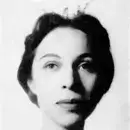
Maria Tallchief, Wa-Xthe-Thomba (Two Standards)
Maria Tallchief, Wa-Xthe-Thomba (Two Standards), (1925–2013) is considered America’s first major prima ballerina and the first Native American (Osage Nation) in this leading role.
At age twelve, Tallchief began training with Bronislava Nijinska, a choreographer and former dancer with Ballet Russes, the premier ballet company of the time. She attended the School of American Ballet in New York in 1942 as a member of the Ballet Russe de Monte Carlo (the successor to Ballet Russes). Tallchief first worked with George Balanchine in the summer of 1944 when the Ballet Russe de Monte Carlo served as the dance ensemble for the Broadway musical Song of Norway. She and Balanchine were married from 1946–1952. In 1947, she became the first American to dance with the Paris Opera Ballet. Returning to New York, she joined Balanchine’s Ballet Society, relaunched as New York City Ballet. Over the course of her eighteen years with the Company, Tallchief starred in numerous productions, originating the title role in Balanchine’s Firebird, and Odette/Odile in Swan Lake, along with new ballets such as Symphony in C, Orpheus, and Scotch Symphony. In 1954, she starred as the Sugar Plum Fairy in The Nutcracker. Tallchief also performed on The Ed Sullivan Show, and in 1952 she played Russian ballerina Anna Pavlova in the musical Million Dollar Mermaid.
In 1960, Tallchief began dancing with American Ballet Theatre (ABT), first as a guest artist and then as lead ballerina. That summer, she performed in Russia with Erik Bruhn, the first American dancer to appear at the Bolshoi Theater in Moscow. She continued to dance with ABT until 1962, when she relocated to Germany, briefly becoming the lead dancer of the Hamburg Ballet. Following her retirement from dancing in 1965, she served as the artistic director of the Chicago Lyric Opera Ballet and the founder and artistic director of the Chicago City Ballet.